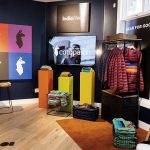Deckers Brands reported that net sales for the first fiscal quarter ended June 30 increased 2.3 percent to $283.2 million compared to $276.8 million for the comparable period last year. On a constant-currency basis, net sales increased by 2.8 percent. Gross margin was 50.3 percent of sales compared to 47.0 percent for the year-ago period. SG&A expenses were $150.3 million compared to $161.4 million for fiscal Q1 last year. The company’s operating loss was $7.7 million compared to an operating loss of $31.4 million in the year-ago period. DECK’s basic loss per share was 28 cents a share compared to a basic loss per share of 67 cents in the comp period last year.
“First quarter performance was a testament to the resilience of our brands, the strength of our eCommerce platform, and the hard work of our employees,” said Dave Powers, president and CEO in a release. “While we are encouraged by the positive start to the fiscal year 2021, we expect further challenges related to the COVID-19 pandemic, depending on the duration and severity of economic effects. We continue to believe our powerful brands, advanced omnichannel capabilities, and healthy balance sheet provide the foundation for our organization to weather this challenging environment and succeed over the long-term.”
Brand Highlights:
- Ugg brand net sales decreased 10.0 percent to $124.7 million for the fiscal first quarter compared to $138.5 million for the same period last year.
- Hoka One One brand net sales increased 37.1 percent in the June quarter to $109.0 million compared to $79.5 million in the year-ago quarter.
- Teva brand net sales for the first quarter decreased 7.9 percent to $35.2 million compared to $38.3 million for the same period last year.
- Sanuk brand net sales for the first quarter decreased 29.2 percent to $13.2 million compared to $18.7 million for the same period last year.
DTC (Direct to Consumer) net sales for the first quarter increased 74.2 percent to $139.8 million compared to $80.3 million for Q1 last year while Wholesale net sales decreased 27.1 percent to $143.3 million in fiscal Q1 compared to $196.6 million for the comp period last year.
Domestic net sales increased 10.2 percent to $184.3 million in the quarter compared to $167.3 million for the same period last year but International net sales decreased 9.7 percent to $98.9 million compared to $109.5 million for the same period last year.
At quarter-end Deckers reported cash and cash equivalents were $661.9 million compared to $502.6 million at June 30, 2019. Inventories were $435.0 million at quarter-end compared to $473.4 million at the end of the quarter last year. Outstanding borrowings were $30.7 million compared to $31.4 million. The full amount of outstanding borrowings relate to the mortgage on the company’s corporate headquarters.
During the first quarter, the company did not repurchase any shares of its common stock. As of June 30, 2020, the company had $160 million remaining under its stock repurchase authorizations. The company has paused share repurchase activity for the time being but retains the discretion to commence share repurchase activity in future periods.
Given the ongoing and fluid economic environment related to the COVID-19 pandemic, the company will not be providing full-year guidance for the fiscal year 2021.
COVID-19 Update
The company continues to modify and evolve its operations in response to the COVID-19 pandemic. The company will continue to review expert agency guidelines, as well as information from health officials and local authorities while assessing and evolving the appropriate scope of operations and allocation of resources necessary to navigate this dynamic and unprecedented environment.
company
Liquidity
As of June 30, 2020, the company had a liquidity position of over $1.1 billion dollars, which included $661.9 million in cash and cash equivalents and $469.7 million available under its existing revolving credit facilities.
As of the end of the first quarter, the company did not have any outstanding borrowings under any of its existing revolving credit facilities.
Retail Stores
During the first quarter, the company reopened many of its stores that were initially closed as a result of the restrictions imposed as part of the COVID-19 pandemic. Approximately 20 percent of the company’s stores were open for the entire 90-day period. The average store was open for roughly half of the quarter. As of this week, approximately 95 percent of the company’s global stores are open. Stores that have reopened have done so with modified operations, including enhanced health and safety protocols. Additionally, most stores that have reopened are operating at a limited capacity as they continue to adapt to new and evolving challenges related to COVID-19. Given the ongoing and uncertain pandemic conditions, which include meaningful local and regional differences in restrictions imposed on retail store operations, the company anticipates the potential risk of additional closures or limitations during peak periods.
Supply Chain
The company’s distribution center in Moreno Valley, California, as well as other third-party distribution facilities that the company leverages to service its operations, are currently in operation and supporting ongoing logistics. However, these facilities may continue to operate at limited capacity due to the enhanced health and safety measures now in place. The company anticipates operational challenges related to capacity constraints, including higher levels of eCommerce shipments during peak wholesale volume periods, as well as increased costs associated with warehouse employee safety and payroll expense. To mitigate these challenges, the company is phasing some wholesale shipments earlier than in previous years, which may impact the timing of revenue between future quarters.
The company maintains a network of strategic sourcing partners which includes material vendors and third-party manufacturers. The company experienced certain capacity constraints within its sourcing network during the first quarter, in addition to disruptions related to travel restrictions between country borders and production facilities. While the effects of these disruptions have been mitigated thus far, it is possible that there will be disruptions in the future.
Board of Directors Announcement
John M. Gibbons is retiring from the Deckers Board of Directors, effective at the end of his term on September 11, 2020. Mr. Gibbons has served as a member of the Board since 2000. Mr. Gibbons is the company’s longest-tenured board member and has made many contributions in his over 20 years with the company. “I want to thank John for his many years of service, partnership, and contributions to the Deckers organization,” said Dave Powers. “We will all miss John’s leadership, and wish him well in his retirement.”
Photo courtesy Hoka One One
















